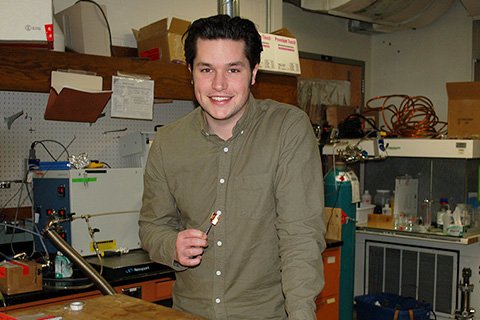Harrison Frisk: Grad student works to build better electronics

Understanding relationships of graphene with other materials could mean faster, smaller, more efficient electronics
Harrison Frisk, a graduate student in chemical physics and recipient of the Robert and Jill DeMaster Fellowship, often quips he is the “odd man out” in his family.With a father who works as a sales account manager, a mother who runs her own interior design firm, a sister who majored in business, and a younger brother who is studying drum performance, he is the only one who followed a path in the sciences.
“I tried film studies for a while, but learned quickly I wasn’t any good at it, nor did I have a talent for it,” he said.
Now, in his second year of graduate work at the University, Frisk is one of three graduate students and a post doc under the tutelage of professor James Johns in the Department of Chemistry. As part of the Johns Research Group, Frisk is examining the 2D nature of new monolayer-based electronic materials such as graphene and MoS2 that could be used to build faster, smaller, and more efficient electronic devices.
“My parents tell me, ‘we don’t understand what you are working on, but we will support you in any way we can,’” Frisk said.
Basically, his work involves studying how atomically-thin materials form interfaces with other materials and how the properties change as a result. He focuses on graphene, which is made from carbon. The material has many extraordinary properties—100 times stronger than the strongest steel, but very flexible; conducts electricity and heat efficiently and is nearly transparent.
His work also uses laser spectroscopy to learn how light interacts with the materials.
“Since graphene is so extremely thin, we are conducting experiments on how other materials may change and affect it, and how we can control these effects in order to give graphene the properties we want,” Frisk said. “Understanding these relationships could have an enormous impact on how devices are manufactured.”
He anticipates what is revealed will be useful in electronics—improving the speed of computer chips—and in increasing the strength and flexibility of sensor applications, such as biomedical detectors.
Choosing a graduate program
Frisk, who grew up in south Minneapolis, discovered his appetite for science while attending Southwest High School. He credits one chemistry teacher, in particular, for strongly steering him toward the sciences. “‘You’re good at this; you really ought to think about this,’ were his words,” Frisk said.
Taking his advice, Frisk completed a bachelor’s degree in chemistry, with minors in physics and mathematics at the University of Arizona in Tucson. Early on, he knew he wanted to go to graduate school. “Getting my undergraduate degree just taught me everything I didn’t know,” he said. “I learned I had a lot more questions that needed answers.”
Frisk applied to 14 graduate school programs and was accepted to 11. “I really didn’t think I would get in,” he said. “I guess the money I spent in application fees paid off, as I had several programs to choose from.”
Making his final school selection turned out to be less daunting than expected. “I wanted to be unbiased toward the University of Minnesota since this is my hometown,” he said. “However, after touring a number of campuses, everything was like clockwork here. The Department of Chemistry was extremely efficient. Minnesota was the only school I visited where that happened. When I compared programs, faculty, research, and facilities, it was an easy decision.”
Financially, it also made a lot of sense.
“Receiving the Robert and Jill DeMaster Fellowship has been a huge help,” Frisk said.
About the fellowship donor
Robert DeMaster (Chem Ph.D. ’70) is a CSE alumnus who retired from 3M in 2001 as its Technical Director. Holder of a number of patents, he now serves as the Chief Technical Advisor and a Director of Suntava, a company that produces natural functional ingredients derived from non-GMO purple corn for food, nutraceuticals, and cosmetic manufacturers.
“The education I received in the Department of Chemistry served me better than I could have imagined. I owe my success to the guidance I received. It was life changing,” said DeMaster.
“It’s impossible today to work your way through graduate school without debt. Funding this fellowship is just one way of giving back to the institution that helped launch my career.”
The DeMasters established the fellowship in the Department of Chemistry with a gift of cash pledged over four years. They continue to increase the fund (and as a result, the annual award amount) with additional cash gifts and the proceeds of a trust they established with a real estate gift.
What the future brings
In addition to the DeMaster fellowship, Frisk receives compensation for teaching introductory chemistry classes for which he was honored with the 2015 Outstanding Teaching Assistant Award. “Sometimes the life of a grad student can be thankless. Receiving the award means a lot, and I appreciate that our work is recognized for making an impact,” Frisk said.
“Eventually, I would like to work on the industry side—perhaps the semi-conductor field or electronics,” said Frisk. “Right now, I’m early into a long-term Ph.D. program. I’m doing what I want and love—scientific research and working with my hands. I think I’m in the right place.”
